Blockchain Weekly | The nation's first blockchain unsecured loan issuance, and the application landing continues to accelerate
On January 2, China's Guangdong Province SME financing platform was officially launched and successfully issued the nation's first online unsecured blockchain financing loan. The platform is provided with technical support from a commercial technology cloud service platform for financial institutions, One Account Financial Technology Co., Ltd.In less than 3 minutes of intelligent matching, the platform accepted the first blockchain-based line The company granted unsecured financing and passed the quota review. Deputy Secretary of the Guangdong Provincial Party Committee and Governor Ma Xingrui, Guangdong Provincial Leaders Lin Keqing, Chen Liangxian, Zhang Hu, Chairman of China Ping An Group Ma Mingzhe, Chairman and CEO of Financial OneAccount, and Ye Wangchun attended the event. At present, the small and medium financial platform has accessed 213 types of government data from 26 government departments, collected information on more than 11 million enterprises in Guangdong province, and entered enterprise risk ratings and portraits. In addition, the platform has successfully connected with 129 financial institutions in the province, such as Industrial and Commercial Bank, Construction Bank, and Ping An Bank, and launched 319 financial products. Through the use of blockchain technology, information sharing, privacy protection, and mutual trust mechanisms have been established, so that not only the authenticity of the enterprise cannot be tampered with, but also the information cannot be tampered with, and financial institutions can query corporate information in accordance with laws and regulations.
Blockchain is accelerating in areas such as supply chain finance. Taking the blockchain as the basic platform and combining the Internet of Things, AIoT and other technologies to solve the credibility of the entire trade process is the general direction of the industry's development. In July last year, the CBRC issued the Guiding Opinions of the General Office of the China Banking and Insurance Regulatory Commission on Promoting the Real Economy of Supply Chain Financial Services to major banks and insurance companies, suggesting that banks and insurance institutions be encouraged to incorporate new technologies such as the Internet of Things and blockchain Embedded trading links. The combination of blockchain and AIoT technology, online and offline linkage is the general direction of industry development.
The Iranian president proposed to issue a cryptocurrency between Muslim countries to break the hegemony of the U.S. dollar, and the influence of cryptocurrencies in the financial competition of big powers has gradually expanded. According to the Associated Press, Iranian President Hassan Rouhani at the Malaysian summit proposed to issue a unified cryptocurrency for Muslim countries to replace the US dollar in order to break away from the rule of the US dollar and the US financial system. Hassan Rouhani pointed out that the United States has adopted economic, trade, scientific and military sanctions on Iran since 1979, and that the United States has used economic sanctions as a main tool for achieving hegemony and bullying other countries. Coincidentally, on November 15, Lianwen reported that the BRIC countries also proposed to issue a cryptocurrency settlement system to resolve payment transactions between members of the group. Cryptocurrencies have always been the indispensable heights of the financial powers of major powers, and they are increasingly showing the potential to have a huge impact on the global economy and financial markets. In the past year, cryptocurrencies such as JP Morgan Chase ’s Morgan Coin, Facebook ’s Libra, and China ’s central bank ’s digital currencies have received increasing attention. Global financial markets are likely to undergo changes driven by blockchain.
- Getting Started with Blockchain | How to calculate Bitcoin transaction fees?
- The "National Team Alliance Chain" blockchain service network will be officially commercialized in April, with hundreds of city nodes
- Telegram official reminder: Gram won't help you get rich
Last week's market review: Chainext CSI 100 rose 0.01%, and the AI performance in the segment was the best. In terms of segmentation, the performance of ETH, basic chain, storage & computing, pure currency, and AI is better than the average level of Chainext CSI 100, which are 0.92%, 0.45%, 0.45%, 0.28%, and 1.4%, BTC, and payment transactions, respectively. , Internet of Things & Traceability, Entertainment Social, Commercial Finance, and Basic Enhancement performed worse than the Chainext CSI 100 average level, respectively -0.25%, -0.18%, -2.03%, -0.71%, -5.97%, -0.09%.
Risk Warning: Uncertainty in regulatory policies, and the development of blockchain infrastructure is not up to expectations.
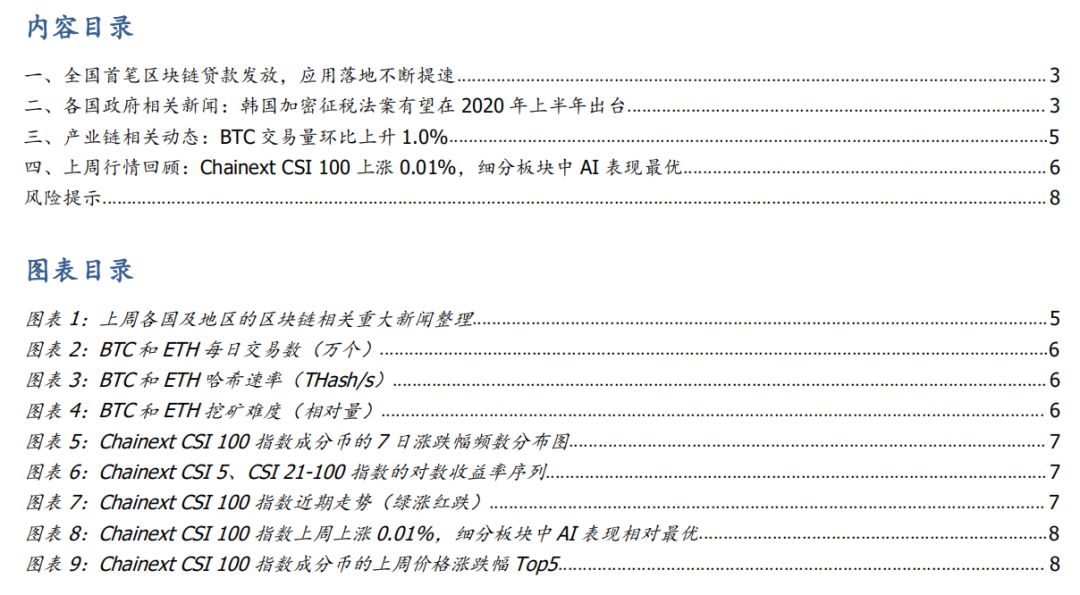
1. The nation's first blockchain loan issuance, and the application landing continues to accelerate
On January 2, China's Guangdong Province SME financing platform was officially launched and successfully issued the nation's first online unsecured blockchain financing loan. The platform is provided with technical support from a commercial technology cloud service platform for financial institutions, One Account Financial Technology Co., Ltd.In less than 3 minutes of intelligent matching, the platform accepted the first blockchain-based line The company granted unsecured financing and passed the quota review. Deputy Secretary of the Guangdong Provincial Party Committee and Governor Ma Xingrui, Guangdong Provincial Leaders Lin Keqing, Chen Liangxian, Zhang Hu, Chairman of China Ping An Group Ma Mingzhe, Chairman and CEO of Financial OneAccount, and Ye Wangchun attended the event. At present, the small and medium financial platform has accessed 213 types of government data from 26 government departments, collected information on more than 11 million enterprises in Guangdong province, and entered enterprise risk ratings and portraits. In addition, the platform has successfully connected with 129 financial institutions in the province, such as Industrial and Commercial Bank, Construction Bank, and Ping An Bank, and launched 319 financial products. Through the use of blockchain technology, information sharing, privacy protection, and mutual trust mechanisms have been established, so that not only the authenticity of the enterprise cannot be tampered with, but also the information cannot be tampered with, and financial institutions can query corporate information in accordance with laws and regulations.
Blockchain is accelerating in areas such as supply chain finance. Taking the blockchain as the basic platform and combining the Internet of Things, AIoT and other technologies to solve the credibility of the entire trade process is the general direction of the industry's development. In July this year, the CBRC issued the Guiding Opinions of the General Office of the China Banking and Insurance Regulatory Commission on Promoting the Real Economy of Supply Chain Financial Services to the major banks and insurance companies, suggesting that banks and insurance institutions be encouraged to incorporate new technologies such as the Internet of Things and blockchain. Embedded trading links. The combination of blockchain and AIoT technology, online and offline linkage is the general direction of industry development. This year, the results of the selection of blockchain innovation results were announced at the 7th China Electronic Information Expo (CITE 2019), and Tencent Cloud's blockchain supply chain finance (warehouse receipt pledge) solution was awarded "CITE2019 Blockchain Excellent Solution". . This solution fully integrates Tencent Cloud's blockchain technology and warehouse receipt pledge financing scenarios, and combines technical capabilities such as smart warehousing, smart IoT, artificial intelligence, and big data analysis to effectively solve the identity trust and risks in the traditional warehouse receipt pledge financing process. Control and inefficiency. As a tamper-resistant and traceable database ledger, the blockchain can ensure the authenticity of the data chain; however, online and offline integration alone cannot be solved independently by blockchain technology. By combining with the Internet of Things, AI and other technologies to complete the deep binding online and offline, the transparency of cargo flow, data chain, and credit transfer is further promoted to facilitate the financing of the supply chain and improve efficiency.
Iran's president proposes to issue a cryptocurrency between Muslim countries to break the hegemony of the US dollar. According to the Associated Press, Iranian President Hassan Rouhani at the Malaysian summit proposed to issue a unified cryptocurrency for Muslim countries to replace the US dollar in order to break away from the rule of the US dollar and the US financial system. Hassan Rouhani pointed out that the United States has adopted economic, trade, scientific and military sanctions on Iran since 1979, and that the United States has used economic sanctions as a main tool for achieving hegemony and bullying other countries. Coincidentally, on November 15, Lianwen reported that the BRIC countries also proposed to issue a cryptocurrency settlement system to resolve payment transactions between members of the group. Cryptocurrencies have always been the indispensable heights of the financial powers of major powers, and they are increasingly showing the potential to have a huge impact on the global economy and financial markets. In the past year, cryptocurrencies such as JP Morgan Chase ’s Morgan Coin, Facebook ’s Libra, and China ’s central bank ’s digital currencies have received increasing attention. Global financial markets are likely to undergo changes driven by blockchain.
2.Relevant government news: South Korea's crypto taxation bill is expected to be introduced in the first half of 2020
United States : On January 5, the Internal Revenue Service (IRS) stated in its Frequently Asked Questions (FAQs) that donors who donate more than $ 5,000 in cryptocurrencies to charities must conduct tax assessments of their donations.
Singapore : The Singapore Financial Supervisory Authority stated that it will issue five digital banking licenses, including a maximum of two digital full bank licenses and three digital wholesale bank licenses to boost the banking industry20 The most vigorous reform in years. Ant Financial announced on January 2 that it has applied for a digital banking license from the Singapore Financial Supervisory Authority, thereby becoming another giant company entering the digital payment industry in Singapore, following the Southeast Asian travel giant Grab and the gaming company Razer.
South Korea : Recently, the Ministry of Economy and Finance, which oversees South Korean economic policy, has officially announced that under the current tax law, profits made by individual investors through crypto transactions cannot be taxed. Although personal cryptocurrency profits are currently tax-free in South Korea, the Ministry of Economy and Finance has been working to amend tax laws to tax them. The Korean crypto taxation bill is under discussion and is expected to be introduced in the first half of 2020.
Venezuela : The Central Bank of Venezuela is operating the BolivarCoin node. On January 5, members of the BolivarCoin Telegram community discovered that a node with an IP address of 200.35.132.80 was suspected to be connected to the Central Bank of Venezuela (BCV). After verification, the node was indeed operated by the Central Bank of Venezuela.
Turkey : The Turkish Regulatory Capital Markets Board (CMB) is planning to speed up its Bitcoin and cryptocurrency supervision in 2020. The move was mainly due to pressure from public agencies and local governments. CMB may emphasize the monitoring, supervision and auditing of Bitcoin and general cryptocurrencies. To date, Turkey has no fixed laws governing cryptocurrency use in Turkey. However, CMB has said it will strengthen supervision. The commission may take measures not only on cryptocurrencies, but also on cryptocurrency exchanges.
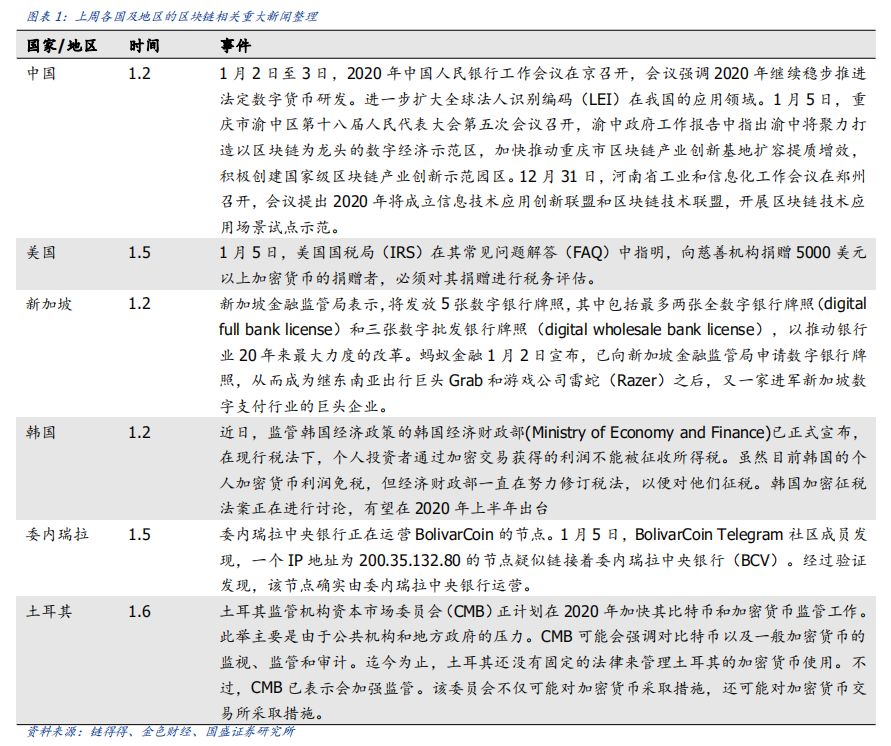
3. Industry chain related dynamics: BTC transaction volume rose 1.0% MoM
Last week, BTC added 2.06 million transactions, an increase of 1.0% month-on-month; ETH added 3.78 million transactions, a month-on-month decrease of 4.7%.
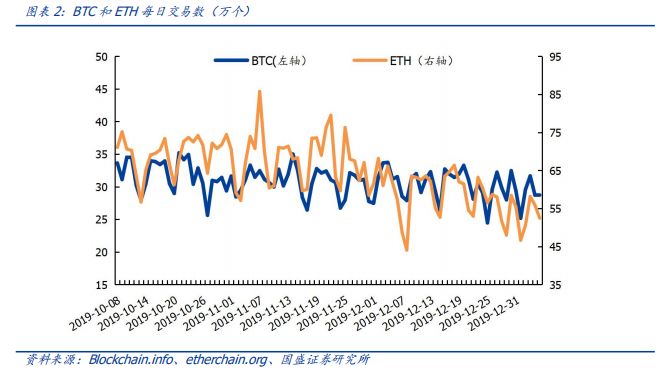
Last week's BTC network-wide mining difficulty was 13.8T, an increase of 3.8% from the previous month; last week, the average ETH mining difficulty of the entire network was 2.26T, a decrease of 10.3% from the previous month.
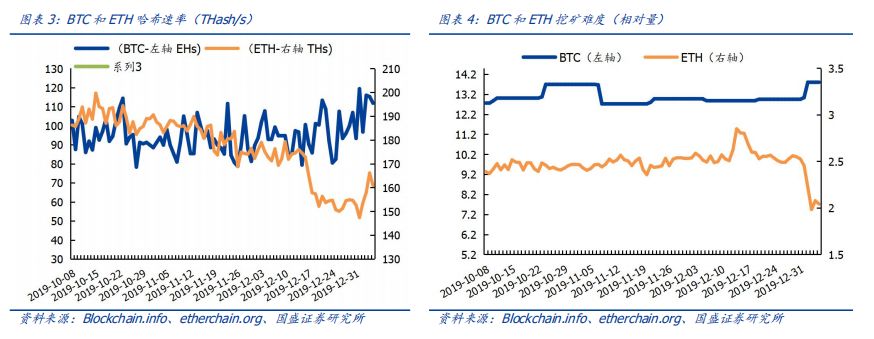
4. Last week's market review: Chainext CSI 100 rose 0.01%, the AI performance in the segment is the best
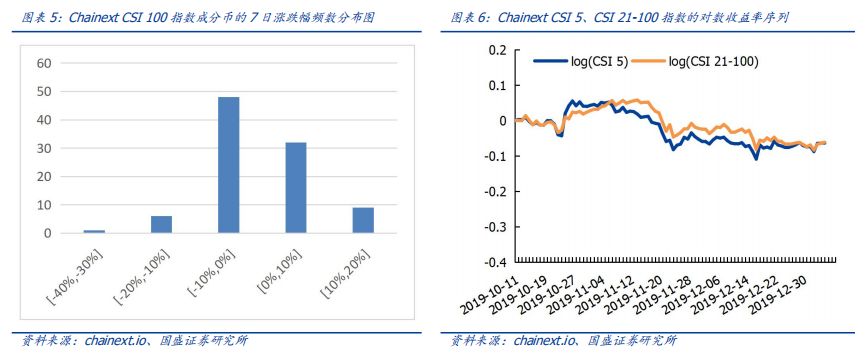
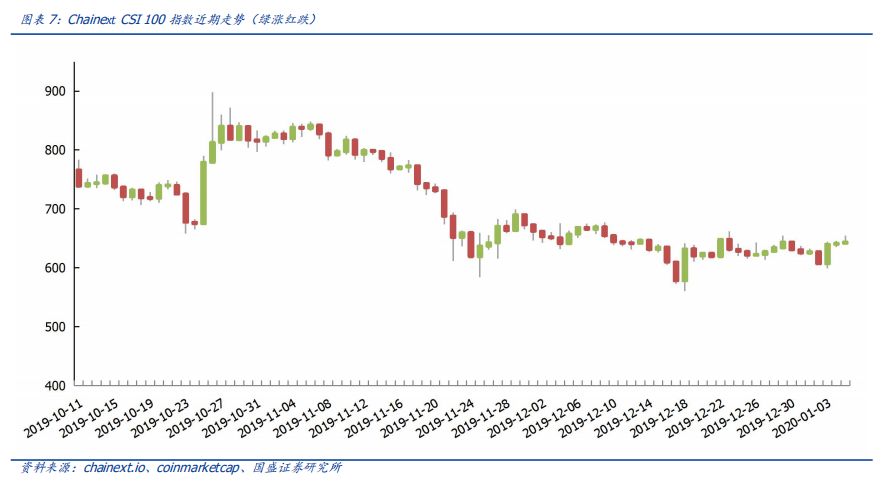
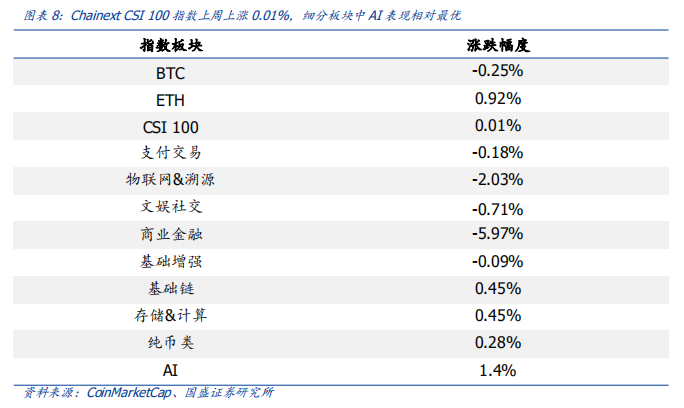

We will continue to update Blocking; if you have any questions or suggestions, please contact us!
Was this article helpful?
93 out of 132 found this helpful
Related articles
- Is crypto taxation complicated? TaxBit receives $ 5 million in seed funding to provide accurate tax calculation tools
- Views | Information theory of money: Is Bitcoin our ultimate choice?
- Digital Securities Research Report 2019: What is preventing it from becoming mainstream? What to expect in 2020?
- Looking ahead to DApp 2020: from smart contracts to application chains
- Technical Articles | What are the bottlenecks and thresholds for developing Dapps on Ethereum?
- Coinbase CEO: the next decade of cryptocurrencies
- From Web2.0 to Web3.0: Is Web3.0 a wake-up call or an alarmist?






